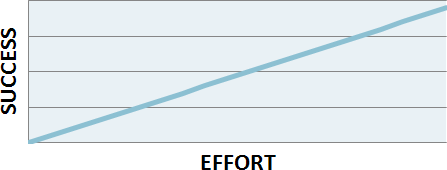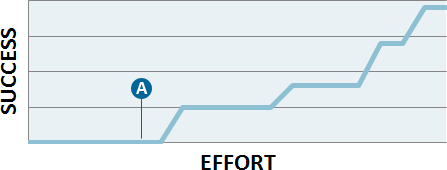We think success is linear.
In the back of our minds, we believe that the relationship between effort and success looks something like this:

You put in a little effort, you get back a little reward. Our 9-5 work mentality has conditioned us to think this way, and sometimes it's true. If you do an hour's work, you'll get an hour's pay most days.
Creativity isn't like that.
The problems come when we start to take a broader view of success, such as finishing a major creative project or working toward anything that doesn't have a set value structure (like a weekly salary) imposed on it. That kind of success often looks more like this:

What about Point A?
What happens when you've put in some effort (maybe months of effort) and you haven't seen any reward yet? It's not just disillusioning – it can be downright destructive. If you've banked your future on a new direction and you've got nothing to show for it, the reality of how success arrives could be the difference between paying the mortgage and being homeless.
It's one thing if you're working on a painting in your spare time, but it's another thing if you're an entrepreneur. Point A for someone starting a new business means blood, sweat, and tears, but no cash to pay the bills. It can be frustrating and have very real consequences.
So, what do you do?
I wish I had an easy answer to that. On the practical side, you have to be realistic and plan. It's sad to say, but if you start a new restaurant with 60 days worth of cash and it's going to take you a year to break even, you're probably doomed before you even started. It may sound harsh, but I think entrepreneurs need to leap with both eyes wide open.
The rest is, for lack of a better word, faith. That first taste of success will come, but if you're at Point A, you don't know if it'll come in a day, a week, or a month. You have to survive, and you have to put in the work. If you do, you have a real shot at something. Along the way, you're producing, learning, refining your skills, and gaining dividends, even if you can't see it clearly. Eventually, you start to trust the payoff will come, and you stop worrying so much about the end result.
Focus on survival.
When our daughter was born this past summer, our pediatrician gave us some great advice – "Your job for the next 2 weeks is to survive." It sounds funny, but that advice was like a permission slip. It gave us the freedom to stop worrying about all the baby books and classes and videos and just experience being parents.
When you're in a start-up mode, whether it's an actual start-up business, creative project, or just the first step in a long-term project like cleaning out the house, focus on "survival." Don't second-guess yourself, don't make 10 course corrections every day based on no data – just get to work and see what happens.